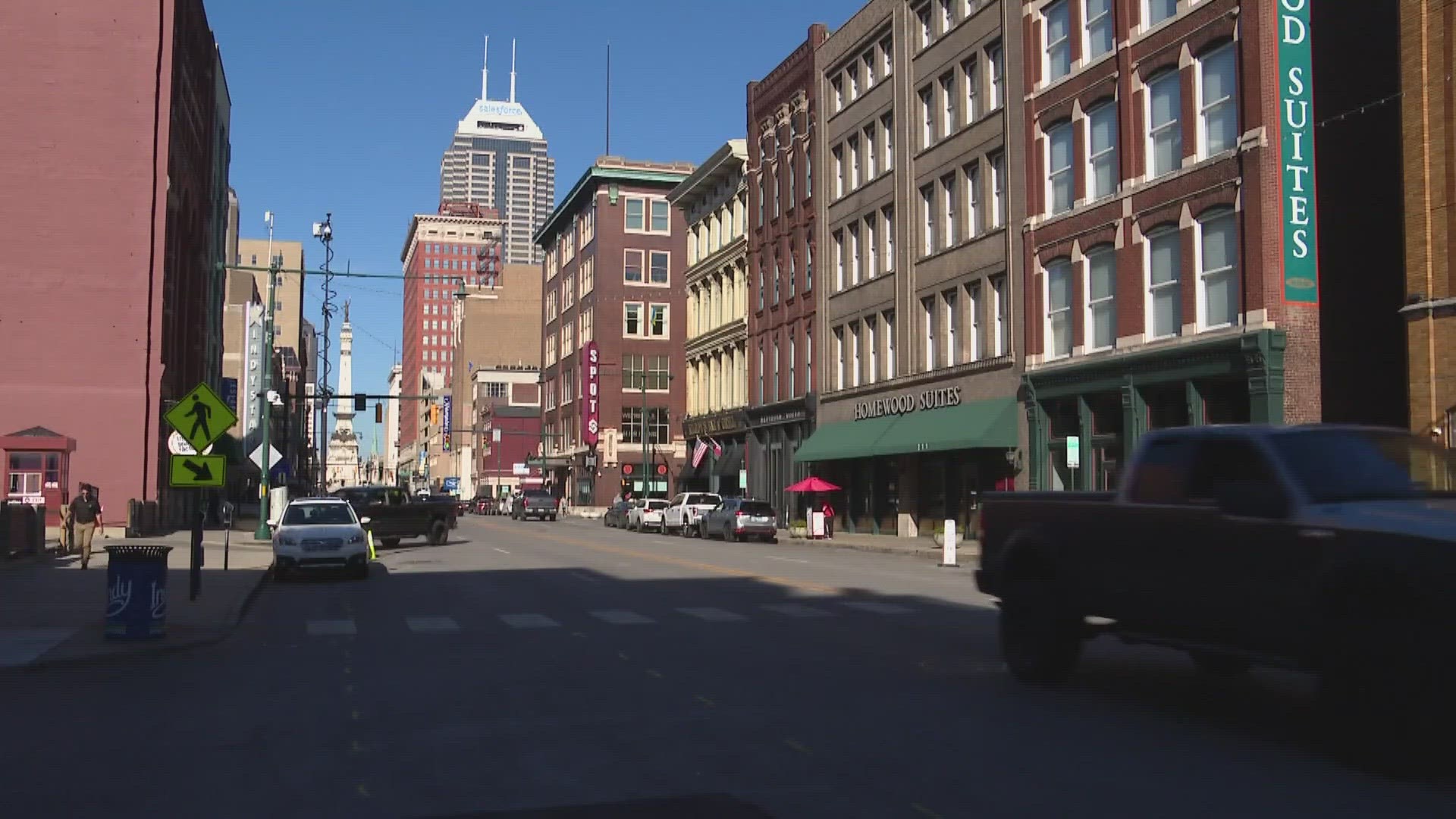INDIANAPOLIS — On Monday, Nov. 13, a proposal will be introduced to the Indianapolis City-County Council to create an Economic Enhancement District (EED) downtown to address safety, cleanliness and homelessness.
According to Downtown Indy Inc., downtown Indianapolis is the largest central business district in the country without this type of direct investment tool.
The ability to create this district was first authorized by the Indiana General Assembly during the 2023 legislative session.
What's an economic enhancement district?
An EED is a funding tool to provide an increased level of services to address specific challenges and opportunities facing a central business district.
According to the city, the funding will provide things like seven-day-a-week cleaning services, increased safety presence, new public safety technology and homeless outreach workers within the Mile Square.
Downtown Indy, Inc. also said property owners would be able to decide how they want to invest in downtown.
“This is a critical tool to help downtown thrive and attract new residents and businesses,” Indianapolis City-County Council President Vop Osili said. “The Mile Square faces the unique challenges of all large urban centers, and an EED will allow for targeted investment to maintain our clean, safe and beautiful downtown. This will include day-to-day operations and maintenance to ensure a vibrant downtown, 365-days-a-year, as well as increased homelessness outreach and Housing Hub operations.”
Why is it needed?
For the last few years, the city has used extra funding through the American Rescue Plan Act to create a pilot program operated by Downtown Indy, Inc. to provide extra services downtown.
That includes cleaning crews that pick up litter, remove graffiti and power-wash sidewalks. The money has also helped with increasing public safety presence, adding new crime-fighting technology and employing outreach workers to provide resources and engage with those experiencing homelessness.
However, those federal funds are running out. So, an EED would provide a sustainable funding source for downtown to continue and expand these services.
“The EED will give Mile Square property owners a mechanism to decide how they want to invest in their downtown,” said Taylor Schaffer, president and CEO of Downtown Indy, Inc. “The enhanced services we’ve been able to provide have served as a proof of concept for expanded operations downtown and allowed property owners to engage directly with these new resources. We want to ensure that, moving forward, we have the tools available to sustain this level of service that our downtown deserves.”
What's the cost?
The EED would be funded by a fee on taxable property within the district based on the assessed value of the property. For downtown Indianapolis, this fee would include property within the Mile Square, and the rate would be set by the City-County Council.
The fee would go into effect in 2025, and the properties will be assessed in 2024.
Downtown Indy Inc. would administer the funds but not dictate projects.
The proposed annual budget is $5.5 million for the EED. That includes expanding services for public safety, homelessness outreach, cleaning services and operations support for a Housing Hub low-barrier homeless shelter.
“The proposed budget for the EED is directly aligned with the priorities of the downtown business community,” said Taylor Hughes, vice president of policy and strategy for the Indy Chamber. “Investing in public safety, cleanliness and homelessness are key to supporting our downtown businesses and workers and creating a vibrant, thriving Mile Square.”
The EED would be overseen by an appointed board of mostly property owners within the district.
The funds will be separate from the existing city budget and services.
Homelessness shelter
The EED would also fund the first Housing Hub low-barrier homeless shelter in the city.
Right now, the construction is being funded by the state with $20 million and $12 million by the city. It is scheduled to be completed in 2025 and go near Georgia and Shelby streets.
Once completed, the proposed annual budget of the EED calls for $1.5 million for operational support.
The shelter will be 24/7 and eliminate sobriety and income requirements. It will provide a medical clinic, BMV, benefits enrollment, meals, phone charging, internet access and employment services.
It will also prioritize finding safe and appropriate housing alternatives for those experiencing homelessness.
What's next?
The EED proposal will be introduced to the City-County Council on Monday, Nov. 13 and will be heard by the Metropolitan and Economic Development Committee on Monday, Nov. 20.
It will then be returned to the full council on Dec. 4 for a final vote.

